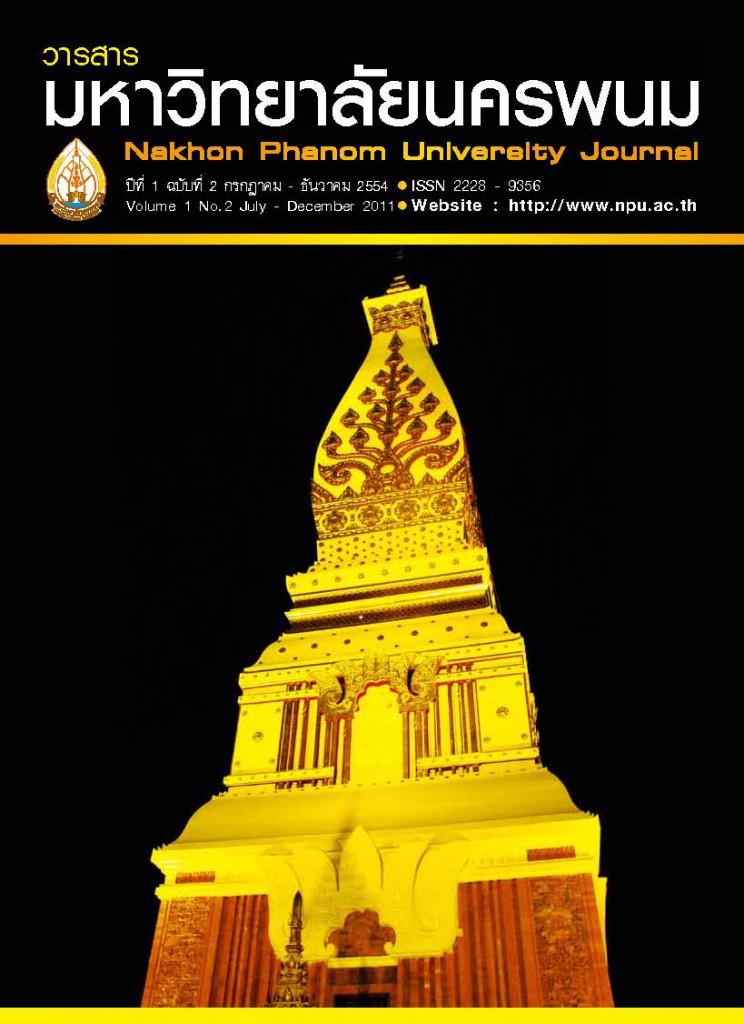ปัจจัยที่ส่งผลต่อประสิทธิผลการดำเนินงานการประกันคุณภาพภายในของโรงเรียน สังกัดสำนักงานเขตพื้นที่การศึกษาในจังหวัดนครพนม
Main Article Content
Abstract
การวิจัยครั้งนี้เป็นการศึกษาปัจจัยที่ส่งผลต่อประสิทธิผลการดำเนินงานการประกันคุณภาพภายในของโรงเรียน สังกัด
สำนักงานเขตพื้นที่การศึกษาในจังหวัดนครพนม ประชากรที่ใช้ในการวิจัย ได้แก่ ผู้บริหารโรงเรียน ผู้รับผิดชอบงานประกันคุณภาพภายในของโรงเรียนและครูผู้สอนในโรงเรียนสังกัดสำนักงานเขตพื้นที่การศึกษาในจังหวัดนครพนม ปีการศึกษา 2552 จำนวน 6,108 คน กลุ่มตัวอย่างที่ใช้ในการวิจัย จำนวน 364 คน ประกอบด้วยผู้บริหารโรงเรียน 91 คน ผู้รับผิดชอบงานประกันคุณภาพภายในของโรงเรียน 91 คนและครูผู้สอน 192 คน ได้มาโดยวิธีการสุ่มแบบหลายขั้นตอน เครื่องมือที่ใช้ในการเก็บรวบรวมข้อมูลเป็นแบบสอบถามชนิดมาตราส่วนประมาณค่า วิเคราะห์ข้อมูลโดยใช้โปรแกรมคอมพิวเตอร์สำเร็จรูป สถิติที่ใช้ในการวิเคราะห์ข้อมูล ได้แก่ ค่าร้อยละ ค่าเฉลี่ย ค่าความเบี่ยงเบนมาตรฐาน การวิเคราะห์ความแปรปรวนทางเดียว ค่าสหสัมพันธ์อย่างง่ายของเพียร์สัน และการวิเคราะห์การถดถอยพหุคูณด้วยวิธีแบบขั้นบันได ผลการวิจัยพบว่า 1) ปัจจัยที่ส่งผลต่อประสิทธิภาพการดำเนินงาน การประกันคุณภาพภายในของโรงเรียนและประสิทธิผลการดำเนินงานการประกันคุณภาพภายในของโรงเรียน ตามความคิดเห็นของผู้บริหารโรงเรียน ผู้รับผิดชอบงานประกันคุณภาพภายในของโรงเรียนและครูผู้สอนโดยรวมและรายด้านอยู่ในระดับมากและไม่แตกต่างกัน โดยเรียงลำดับจากมากไปน้อย คือ ด้านภาวะผู้นำของผู้บริหาร ด้านการมีส่วนร่วมและปรึกษาหารือของผู้ที่มีส่วนเกี่ยวข้อง ด้านการติดต่อสื่อสาร ด้านการทำงานเป็นทีม ด้านทัศนคติและทักษะของบุคลากรในโรงเรียน ด้านทรัพยากรทางการศึกษาและด้านเทคโนโลยีทางการศึกษา 2) ผู้บริหารโรงเรียน ผู้รับผิดชอบงานประกันคุณภาพภายในของโรงเรียนและครูผู้สอนที่ปฏิบัติหน้าที่ในโรงเรียนช่วงชั้นแตกต่างกัน มีความคิดเห็นเกี่ยวกับประสิทธิผลการดำเนินงานการประกันคุณภาพภายในของโรงเรียนแตกต่างกันอย่างมีนัยสำคัญทางสถิติที่ระดับ .05 3) ปัจจัยมีความสัมพันธ์ทางบวกกับประสิทธิผลการดำเนินงานการประกันคุณภาพภายในของโรงเรียนอยู่ในระดับสูง อย่างมีนัยสำคัญทางสถิติที่ระดับ .01 4) ปัจจัยที่มีอำนาจพยากรณ์ประสิทธิผลการดำเนินงานการประกันคุณภาพภายในของโรงเรียนอย่างมีนัยสำคัญทางสถิติที่ระดับ .01 โดยมีค่าอำนาจการพยากรณ์ร้อยละ 73.00 และมีค่าความคลาดเคลื่อนของการพยากรณ์ .267 คือ ด้านภาวะผู้นำของผู้บริหาร ด้านทรัพยากรทางการศึกษา ด้านการมีส่วนร่วมและปรึกษาหารือของผู้ที่มีส่วนเกี่ยวข้องด้านเทคโนโลยีทางการศึกษา ด้านการติดต่อสื่อสารและด้านการทำงานเป็นทีม 5) ปัจจัยที่ควรส่งเสริมเพื่อเพิ่มประสิทธิผลการดำเนินงานการประกันคุณภาพภายในของโรงเรียน ได้แก่ ภาวะผู้นำของผู้บริหาร ทรัพยากรทางการศึกษา การมีส่วนร่วม
และปรึกษาหารือของผู้ที่มีส่วนเกี่ยวข้อง เทคโนโลยีทางการศึกษา การติดต่อสื่อสารและการทำงานเป็นทีม
This research aimed to study the factors affecting the effectiveness of the management of Internal Quality Assurance in schools under the Office of Nakhon Phanom Educational Service Area. The population was 6,108 consisted of school administrators, school staff accounted for the internal quality assurance and teachers under the Office of Nakhon Phanom Educational Service Area in academic year 2009. Multi-stage random sampling was
applied to formulate a sample of 364 which consisted of 91 school administrators, 91 school staff accounted for the internal quality assurance and 192 teachers. The instrument used to collect data was a set of rating-scale questionnaire. Statistics involved were the percentage, mean, standard deviation, One-Way Analysis of Variance, Pearson’s Product Moment Correlation Coefficient, and Stepwise Multi-Regression Analysis. The results of this
research are as follows: 1) Factors affecting the performance of internal quality assurance of schools in the opinions of school administrators, school staff accounted for the internal quality assurance and teachers as a whole and individual the aspects were at high level and not different which showed the order from high to low in administrator’s leadership, stakeholder’s participation and consultation, communication, teamwork, staff’s attitude and skills, educational resources and technology, respectively. 2) School administrators, school staff accounted for the internal quality assurance and teachers worked in different educational stratification had the opinions about the effectiveness internal quality assurance of schools significantly different at .05 level. 3) Factors revealed the high positive
correlation with effectiveness of internal quality assurance of schools at .01 level of significance. 4) Factors had predictive power with effectiveness of internal quality assurance of schools at .01 level of significance. It revealed the predictive power of 73 percent and predictive error of .267 in the aspects of administrator’s leadership, educational resources, stakeholder’s participation and consultation, educational technology, communication and teamwork. 5) Factors which should be encouraged to increase the performance of internal quality assurance of schools were administrators’ leadership, educational resources, stakeholder’s participation and consultation, educational technology, communication and teamwork.


